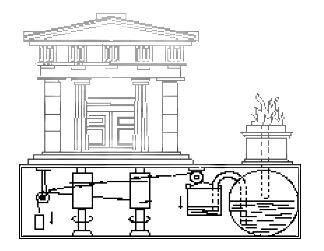| Hypercommunication - Crash Courses - Second-order Systems Theory [ Hyper-Library ] [ Hyper-Lexicon ] [ back ] |
|
|
backward - Page 14 - forward |
|
Constructive explanations describe a construction with which I can create the phenomenon. Heron von Alexandria - who by nature was loved more by the gods than by the temple guards - explains the phenomenon that the temple doors open when a fire is lit in front of them with an underground machine in which a steam engine heated by the fire moves the doors with ropes (note 1). Since ordinary mortals among the ancient Greeks were not generally blessed with technology, nor could they look under the temple, it was up to them to accept this explanation. I also cannot look under the temple, because it no longer exists. But I can check whether the mechanism would fulfil its function, that is, whether I could create the phenomenon with this mechanism. That is the specific quality of the constructive explanation. And conversely, constructive explanations of course always have the practical value that one could build such a temple with them. The analysis of the phenomenon becomes the construction of the solution.
|

|
The constructive explanation is also a description, but it is a description with which I map a mechanism that I could produce and show instead of the description. If I use "gods" in my explanation, I can at best show their effect, but not themselves. Therefore, constructive explanations are more intimate for me, they connect me more with other people than gods do.
|
Give a constructive and a non-constructive explanation to a phenomenon! |
Thus the task is reversed: you have to find a suitable phenomenon! |
|
Examples:
|
When I explain a phenomenon, I change the observer perspective. In one perspective, I perceive objects and events that I can turn into phenomena, and in the other perspective I see procedures by which I can explain the phenomena. In one perspective I behave quasi receptive and interpretive, in the other perspective I am active and constructive. When I construct explanations, I construct systems. If I can only check the explanation functionally, I call the potential system black box.
|
|
backward - Page 14 - forward |